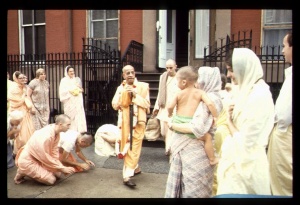Absolute Truth is Personal

A.C. Bhaktivedanta Swami Prabhupada
The Absolute Truth is ultimately a person who is supreme and all-powerful. He is called Purusottama. Impersonal Brahman is the effulgence of His personal body and localized Paramatma or the Supersoul is His plenary part. That is the verdict of all the sastras, especially the Bhagavad-gita, Srimad-Bhagavatam, and all other allied transcendental literatures. The whole sankirtana movement of Lord Caitanya is aimed at giving importance to the Personality of Godhead and His transcendental service. As such, Lord Caitanya always regarded the impersonal conception of the Absolute Truth as detrimental to the path of devotional activities. He considered the system of varnasrama-dharma to be external because even if varnasrama-dharma is properly carried out, one still cannot get a clear conception of the Personality of Godhead.
Ramananda's suggestion of the sloka from the Bhagavad-gita about offering everything to Krsna definitely advances the conception of the Personality of Godhead, but still the practice of this conception is not fully transcendental. Thus the varnasrama-dharma conception can hardly help to raise the practitioner to the transcendental spiritual plane. Lord Caitanya thus rejected this material conception of the Personality of Godhead and called it external.